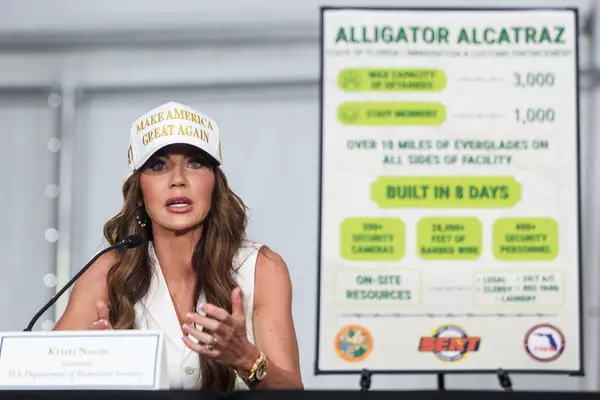NOTE: VIDEO AT THE END OF THE ARTICLE.
Department of Homeland Security Secretary Kristi Noem revealed over the weekend that several states are exploring the possibility of adopting Florida’s “Alligator Alcatraz” migrant detention facility model. The announcement marks a potential broadening of a controversial immigration enforcement strategy as states seek stronger tools to manage migrant flows and coordinate with federal authorities.
The “Alligator Alcatraz” facility, located deep within Florida’s Everglades at the Miami-Dade Collier Training Facility, has become a focal point in the national immigration debate. Developed through a partnership between Florida’s state government and federal agencies, it functions as both a detention and deportation center for migrants apprehended at or near the southern border. Secretary Noem described the collaboration as a “successful partnership” and indicated that five other states are currently in talks to replicate the program.
While Noem did not disclose the names of the interested states, her announcement signals a growing trend among governors to collaborate with the federal government on immigration enforcement solutions amid a complex and politically fraught landscape. Border states, in particular, face mounting pressure to control increasing migrant arrivals and have expressed interest in innovative detention models.
The facility itself occupies approximately 158,000 square feet and boasts several amenities aimed at addressing migrant welfare, a key point emphasized by proponents in response to criticism. According to officials, the center is equipped with 24/7 air conditioning, a medical clinic, recreational yards, laundry services, and access to clergy support. Florida Emergency Management Director Kevin Guthrie highlighted the building’s robust construction, noting its aluminum frame is designed to withstand winds of up to 110 mph, equivalent to a high-end Category 2 hurricane.
Despite these assurances, “Alligator Alcatraz” has attracted considerable scrutiny from civil liberties advocates, immigrant rights organizations, and some national media outlets. Critics argue that the facility symbolizes a harsh approach to immigration that risks mistreating vulnerable populations and lacks transparency. Concerns over conditions, prolonged detention periods, and the broader implications for migrant rights have fueled protests and calls for independent oversight.
Supporters counter that the facility provides a humane and secure environment that balances enforcement priorities with basic standards of care. They contend that its remote location within the Everglades serves operational purposes by limiting escape attempts and improving logistical management.
The push to expand the model to other states underscores the ongoing debate over immigration policy in the United States. While federal immigration laws remain largely unchanged, states increasingly assert their influence through localized enforcement strategies, detention facilities, and partnerships with federal agencies. This dynamic has intensified partisan divisions and complicated efforts to craft comprehensive immigration reform.
Secretary Noem’s comments came amid rising migration numbers and renewed political focus on border security. Many governors are seeking alternatives to federal detention centers, which have faced capacity issues and criticism over conditions. The “Alligator Alcatraz” model represents a novel approach aimed at decentralizing migrant detention and leveraging state resources.
The announcement also reflects broader discussions about the role of state governments in immigration enforcement—a traditionally federal domain. As states negotiate with the Department of Homeland Security, questions remain about legal authority, funding, and the impact on migrant communities.
While the full list of interested states remains undisclosed, Noem’s statement confirms a growing appetite for replicating Florida’s approach. The coming months may see formal agreements, facility construction, or conversions of existing structures in other states adopting similar models.
As the political battle over immigration continues, the expansion of “Alligator Alcatraz” serves as a notable example of how innovative—and contentious—detention strategies are shaping policy and public discourse at multiple levels of government.
PLAY:

Sarah Mitchell is a bestselling novelist recognized for her insightful and emotionally resonant stories that explore the complexities of human relationships. Originally from Denver, Colorado, Sarah grew up in a family of teachers who nurtured her curiosity and love for storytelling. She studied psychology at Stanford University, where she became fascinated by the intricacies of human behavior—an interest that would later shape her writing career. Sarah’s novels are praised for their nuanced characters, intricate plots, and ability to capture the subtle tensions that define love, friendship, and family ties. Her breakthrough novel, The Spaces Between Us, became an instant bestseller, lauded for its honest portrayal of strained family relationships and the fragile bonds that hold people together. Since then, she has published several works that continue to captivate audiences around the world. Outside of her writing career, Sarah is passionate about mental health advocacy and often partners with organizations to promote awareness and support for those struggling with emotional well-being. Her personal life is quieter—she enjoys hiking in the Colorado mountains, practicing yoga, and spending time with close friends. With each new book, Sarah Mitchell cements her reputation as a writer who illuminates the beauty and struggles of human connection.









